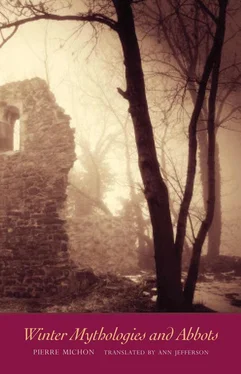Sometime later — weeks or years — he senses that he is dying. He summons the monks, requests his stole and his crozier for the kiss of farewell. The monks fetch them; they bend over him and talk of the God who awaits him, in joy, in glory. Yes, Èble who can no longer see their faces sees that glory does exist, and that it is manifest. That glory is a mixed thing. That it is a dazzling flame which burns bright when it encounters things that are mixed. This he accepts. It is born of the women’s wound, it’s a fair-haired little girl who appears, sparkles, and vanishes. For Guillaume it was mixed with iron and with blood. For God it’s mixed with the choir of angels and the actions of men; it’s mixed with the flesh of the Son who bled on the Cross. It’s mixed too with the embroidered stole which has been placed on him and with the crozier which he grips with a withered hand that shakes. One by one the monks bend down and give him the kiss of farewell; for one last time, shaking as he does so, he makes the sign of salvation over them. He lies back in the glory of the chant for the dying sung by thirty virile voices.
The boat arrives. The monks see him sit up with a start and cry out; he’s afraid he might see two sections of a dead man. But there’s nothing except a small, fair-haired girl. He climbs aboard, and she ferries him away.
It is to Pierre de Maillezais, who was certainly not called Pierre but chose this monastic Christian name when he renounced the world, who acquired the name Maillezais neither from his place of birth nor from his family but as a monk in the abbey of Saint-Pierre de Maillezais, and who wrote his Chronicle of Maillezais in the years when, from the kennels in Hastings, Guillaume, grandson of Guillaume Long-Sword, was releasing his hordes across England — in sum, to this hybrid, this forgery, this purely nominal entity that I owe the tale I am about to tell.
Pierre relates that in the beginning, long before he was a monk, even before he was born and the monastery existed, there was a boar.
Guillaume, son of Guillaume Towhead, observes this boar. Night after night, he waits and watches for it with passionate attention. Not that there is any shortage of boars: he puts up three a day, or more; he lets them run, this not being the season for boar. Surrounded by water, Maillezais is a deep oak forest where the acorns fall like manna on the population of wild pigs which groan and grumble beneath the shelter of the trees. But this particular boar seems determined, is enormous and enigmatic. Its coat is gray and at the withers it stands taller than a mastiff. Guillaume is watching the edge of the wood at twilight; he doesn’t wait long: the beast’s head appears, its forequarters emerge from the wood, it snuffs the wind with its snout, and Guillaume has plenty of time to see the huge, barely curved tusks, like daggers. Then it bolts and reappears a little farther off, or a little nearer by. It is requesting, tempting, willing. When day comes, no beater has put it up. Pierre in his Chronicle is undecided as to whether the boar is a demon or an angel, or at any rate a messenger.
Guillaume has reached the end of summer with a great fanfare, accompanied by his constable, his household, ninety-four companions and sergeants, his birds, and his blue hounds. It’s just a forest surrounded by a beach and rocks, with not a living soul. Since his father’s day there has been a hunting lodge on the tip of the island, wooden turrets above the water and the forest, pallets for the knights and the horsemen, and, right in the middle of it all, the reason for the existence of the turrets, the pallets, and the stables: a vast covered hall for banqueting. Guillaume — Guillaume Fierabras — is young and powerful, he is free, he has just succeeded his father, and he is disporting himself with tracking game, dancing, and wine. He’s happy. He has also brought the women with him, and Emma, whom he took in Blois and married yesterday in this very spot: she disports herself with tracking game, dancing, and pleasure. She is happy. He loves her flesh. She has a curious way of observing Fierabras, sidelong, with the smile that is special to dark-haired women who have a good head on their shoulders.
She too observes the boar.
Around the Feast of the Holy Cross in September the men and the blue hounds are busy with hart; the women hunt hare on the shore with hawks and sheld-fowl with slender, quivering dogs from Syria. The gray boar emerges from the russet oak wood, and twenty paces off he trots the length of the procession, as if he were following them. The few Syrian dogs foolish enough to approach him are gored without causing him to even swerve from his path. The women turn back and retreat to the castle; they set up a gallop, the boar gallops too, twenty paces off; they take fright, but not Emma. She has a sort of fondness for this monster: it’s like night in full day, like a horse that has scented wild cat and quivers beneath her, like Fierabras who quivers on top of her in the night. He doesn’t leave them until they reach the postern; he trots unhurriedly back toward the tree cover.
At the Feast of Saint Andrew in winter, when the oak woods are smarting in the frost, Guillaume decides that from today they will hunt boar; he’s had enough of hart and buck or wolves. The varlets remove the green tunics worn for deer, put on the gray tunics with which you kill wild pig. The knights have ermine and wolfskins, and they make a fine picture. They are carrying spears and the special four-foot-long swords, whose blade has no cutting edge on the knuckle-bow side. The cavalcade, the ermine and the gray tunics, the blue hounds calmly reach the tree cover, watched by the women in the turrets. Emma in her furs remains on the turret; until the last minute she looks at the wolfskins on Guillaume’s shoulders, the wolves’ heads tossed back and dancing against his hips. There is only the water on the shore and the breeze in the oaks, and then suddenly a great galloping. In the forest you no longer hear the Ho moy, ho moy! Cy va, cy va! of the hart, but the Avant, maistre! Avant! Or sa, sa! We’re in the Middle Ages, of course, horses’ breath in winter, codified cries in the depths of the woods, blue frost.
Ten days, and four times as many boar have been taken, but they haven’t seen the gray. The women, however, have seen him on the edge of the wood as usual, snuffing the wind, and once he even came as far as the postern, within arrow’s reach. Guillaume is now infuriated; he wants this animal, he’ll have it. He will not have it.
At this point Pierre’s Chronicle introduces a character who serves the workings of Providence: it’s Gaucelin, whose body, says Pierre, is sturdy and bright, and I cannot tell whether this brightness is valor, a fair complexion, good looks, or the soul made visible. He has not been conjured out of nowhere, and I will add to Pierre’s Chronicle that he is a very young man, an apprentice knight, a squire from the House of Blois. He has not yet fully attained chivalry: he still sleeps with the churls and sits at the lower end of the table. One evening, as the slender crescent of the moon is appearing just above the woods and the men are finally returning through the archway with their pig carcasses, their enormous hunger, and their laughter, the gray boar thrusts his forequarters between the trunks of two oak trees; he allows his whole body to emerge, takes a few steps so that he can be clearly seen, and waits. Gaucelin has lingered — for a call of nature or from a tendency to daydream, given that bright souls like to linger in the bright frost beneath the moon — he is still in the saddle on the shore. He sees the beast and immediately swings round; he races toward it alone with three blue hounds which had also dawdled. The boar doesn’t move. The other ninety-three men are unharnessing; they’ve not seen or heard a thing in their loud laughter. The women have seen — Emma’s heart beats in her throat. Gaucelin is right over the beast: he can hear its breath with its thick hide and tough bristles, and in the very instant that he hears it, the breath, the hide, and the tough bristles plunge into the forest at a gallop. Providence, the sturdy bright body, and its three blue hounds disappear after it.
Читать дальше











